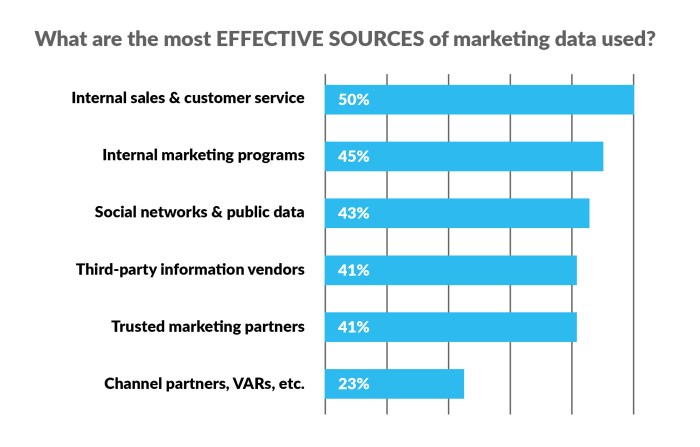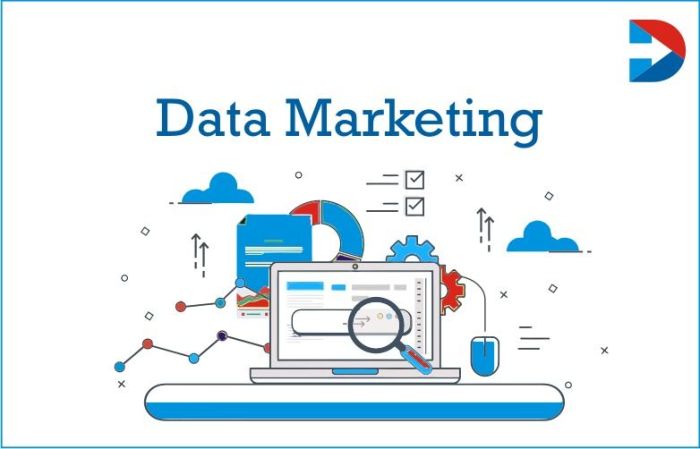Using Customer Data in Marketing sets the stage for this enthralling narrative, offering readers a glimpse into a story that is rich in detail with american high school hip style and brimming with originality from the outset.
Get ready to dive into the world of marketing where customer data reigns supreme, paving the way for targeted campaigns and personalized interactions that leave a lasting impact.
Importance of Customer Data in Marketing: Using Customer Data In Marketing

Customer data plays a crucial role in shaping effective marketing strategies. By leveraging insights gathered from customer data, businesses can tailor their marketing efforts to target the right audience, at the right time, with the right message. This personalized approach not only increases the chances of converting leads into customers but also enhances customer loyalty and satisfaction.
Enhancing Marketing Campaigns with Customer Data
Utilizing customer data allows marketers to create more targeted and relevant campaigns. For example, analyzing purchase history can help identify trends and preferences, enabling businesses to recommend products or services that align with customers’ interests. Moreover, tracking customer interactions across various touchpoints can provide valuable insights into their behavior and preferences, allowing for the customization of marketing messages to resonate with individual customers.
- Segmentation: By segmenting customers based on demographics, behavior, or purchasing patterns, businesses can tailor their marketing strategies to specific target audiences, improving engagement and conversion rates.
- Personalization: Personalized marketing, such as sending personalized emails or targeted advertisements, based on customer data can significantly increase customer engagement and drive sales.
- Predictive Analytics: Predictive analytics can be used to forecast customer behavior, enabling businesses to anticipate needs and preferences and proactively address them through targeted marketing efforts.
Types of Customer Data Used in Marketing
When it comes to marketing, different types of customer data play a crucial role in understanding consumer behavior and preferences. By leveraging this data effectively, businesses can create targeted campaigns that resonate with their target audience.
Demographic Data
Demographic data includes information such as age, gender, income, education level, location, and more. This data helps marketers segment their audience based on specific characteristics, allowing for personalized and targeted marketing efforts.
Behavioral Data
Behavioral data tracks how customers interact with a brand, website, or product. This data includes browsing history, purchase behavior, engagement with marketing campaigns, and more. By analyzing behavioral data, marketers can gain insights into customer preferences, interests, and buying patterns, allowing for more effective targeting and personalized messaging.
Ethical Considerations in Using Customer Data
When it comes to using customer data in marketing, there are important ethical considerations that businesses need to keep in mind. It’s crucial to balance the need for data-driven insights with the responsibility to protect customer privacy and ensure data security.
Ensuring Customer Data Privacy and Security
In order to maintain customer trust and comply with regulations, businesses must implement best practices to safeguard customer data. Some key steps include:
- Obtaining explicit consent from customers before collecting any data.
- Implementing robust data security measures to prevent unauthorized access or breaches.
- Anonymizing or aggregating data whenever possible to protect individual privacy.
- Regularly auditing data practices to identify and address any vulnerabilities.
Maintaining Transparency in Data Usage
Transparency is essential when it comes to using customer data for marketing purposes. Companies should:
- Clearly communicate how customer data will be used and for what purposes.
- Provide customers with access to their own data and the ability to control its use.
- Be upfront about any third parties with whom data may be shared.
- Respond promptly to customer inquiries or concerns about data usage.
Strategies for Effective Use of Customer Data

When it comes to utilizing customer data in marketing, there are specific strategies that can help businesses make the most out of the information they gather. From collecting and analyzing data to implementing successful marketing campaigns, here are some key steps to consider:
Steps for Collecting and Analyzing Customer Data Effectively
Collecting and analyzing customer data effectively requires a structured approach. Businesses can use various methods such as surveys, social media monitoring, website analytics, and customer feedback to gather valuable information. Once the data is collected, it is essential to analyze it thoroughly to identify patterns, trends, and insights that can guide marketing strategies.
Examples of Successful Marketing Campaigns Driven by Customer Data Insights, Using Customer Data in Marketing
One notable example of a successful marketing campaign driven by customer data insights is the personalized recommendations on Amazon. By analyzing customer browsing and purchase history, Amazon can recommend products that are highly relevant to individual customers, leading to increased sales and customer satisfaction.
The Importance of Data Accuracy and Quality in Marketing Initiatives
Data accuracy and quality are crucial for the success of marketing initiatives. Inaccurate or outdated data can lead to ineffective targeting, wasted resources, and missed opportunities. By ensuring that customer data is accurate, up-to-date, and relevant, businesses can create more targeted and personalized marketing campaigns that resonate with their audience.